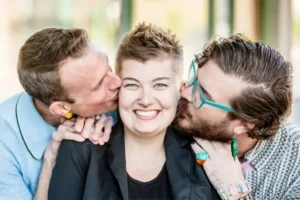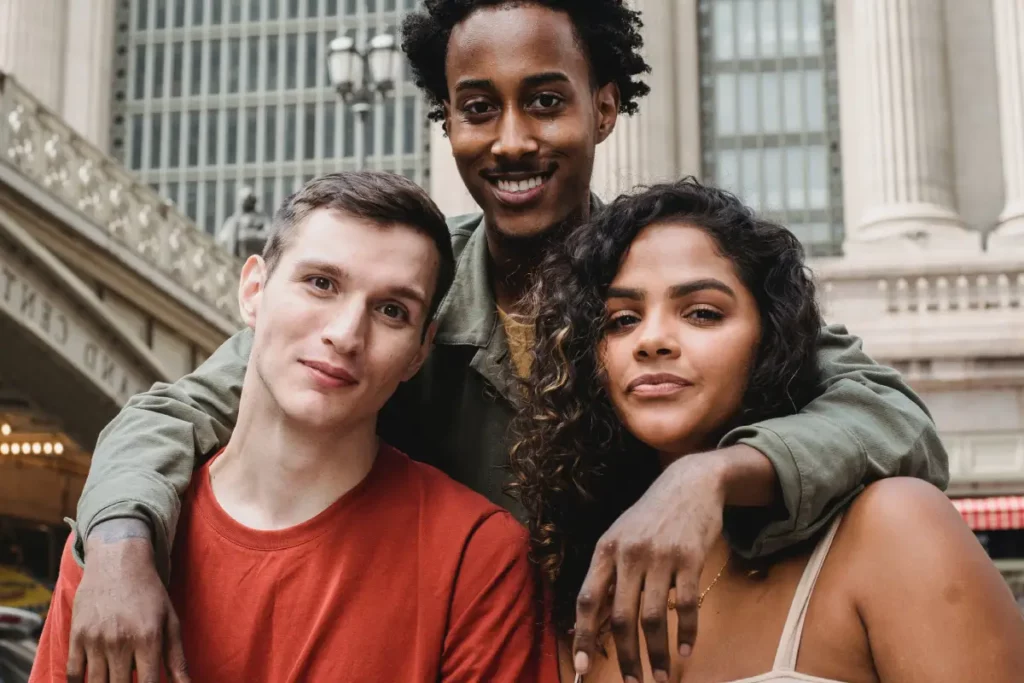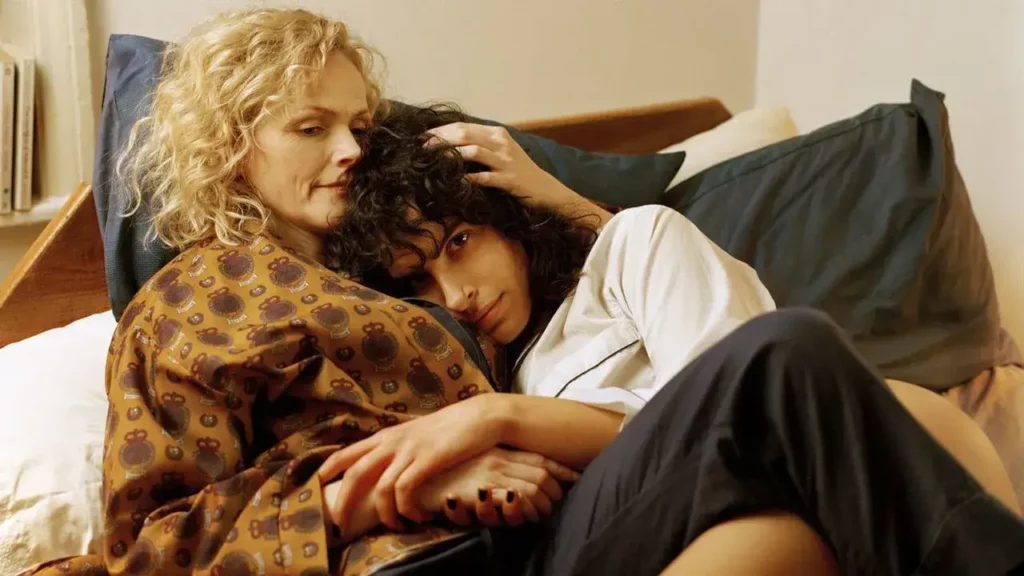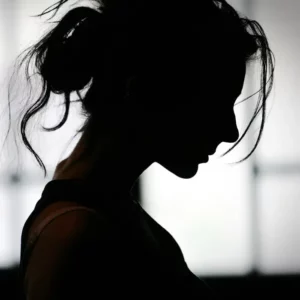Our understanding of sexuality has evolved over the years. As society becomes more accepting, it’s crucial to educate ourselves on the nuances of different sexual orientations. One such orientation that is often misunderstood is bisexuality. In this article, we’ll embark on a journey to unravel the true essence of bisexuality, shedding light on” what is the meaning of bisexual, identifying common signs, and debunking persistent myths.” So, let’s quickly dive in and get started!
Contents
- 1 What Is the Meaning of Bisexual?
- 2 Signs To Know If You Are Bisexual
- 3 Common Myths & Misconceptions About Bisexuality
- 3.1 Bisexuality is a Phase or Confusion
- 3.2 Bisexuals are Equally Attracted to All Genders
- 3.3 Bisexual People are Promiscuous or Unfaithful
- 3.4 Bisexual People Are Greedy
- 3.5 Bisexuality Doesn’t Exist
- 3.6 Only Women are Bisexual
- 3.7 Bisexuals are More Likely to Cheat
- 3.8 Bisexuality Means Half Gay, Half Straight
- 4 Challenges Faced By Bisexual Individuals
- 5 How To Manage These Challenges?
- 6 How Can Professional Help Benefit Bisexual Individuals?
- 7 Conclusion
What Is the Meaning of Bisexual?
 Bisexual, as a term in the realm of sexual orientation, refers to an individual who experiences romantic, emotional, and/or sexual attraction to both males and females. It encompasses attraction to people regardless of their sex or gender identity. A bisexual person may be drawn to different genders in a myriad of ways, and not necessarily to the same extent, or in the same manner.
Bisexual, as a term in the realm of sexual orientation, refers to an individual who experiences romantic, emotional, and/or sexual attraction to both males and females. It encompasses attraction to people regardless of their sex or gender identity. A bisexual person may be drawn to different genders in a myriad of ways, and not necessarily to the same extent, or in the same manner.
In other words, bisexuality rejects the notion of an exclusive ‘either-or’ preference, allowing for a broader spectrum of attractions. The term embraces the fluidity of human sexuality and recognizes that attraction can exist beyond the binaries of male and female, breaking the confines of traditional gender norms.
Signs To Know If You Are Bisexual

Determining your sexual orientation can be a deeply personal journey. However, if you’re questioning whether you might be bisexual, here are some common signs that may guide you. It’s important to remember that everyone’s experience with bisexuality is unique, and these are not definitive rules but mere indicators:
- Attraction to Multiple Genders: The most common sign of bisexuality is a romantic, emotional, or sexual attraction to more than one gender. You may find yourself drawn to both men and women or even those who identify outside the binary spectrum.
- Changeable Attraction: You might notice that your attraction towards different genders varies over time. This doesn’t mean your bisexuality is invalid; it’s merely a reflection of its fluid nature.
- Previous Relationships or Experiences: Reflecting on your past relationships and experiences may provide insight. Have you ever felt romantic or sexual feelings for individuals of different genders?
- A Sense of Belonging: Feeling a sense of ‘fit’ or belonging when you hear others talking about bisexuality, or when you engage with bisexual communities or media, can also be an indicator.
- Emotional Connections: You can form deep emotional bonds with people of more than one gender, whether or not these feelings are accompanied by sexual attraction.
- Excitement and Curiosity: You might feel excited or curious about being with people of different genders in a romantic or sexual context.
- Self-Identification: Lastly, and most importantly, you identify as bisexual. Self-identification is the most significant aspect of your sexual orientation.
Remember, it’s perfectly okay to be unsure or questioning. Understanding your sexual orientation is a personal journey and it’s important to take your time. You’re the one who defines your identity – nobody else.
Common Myths & Misconceptions About Bisexuality

Despite societal advances, bisexuality remains shrouded in myths and misconceptions that often perpetuate harmful stereotypes. Here are some common ones that need to be debunked:
Bisexuality is a Phase or Confusion
This myth portrays bisexuality as a temporary state of confusion or a transitionary phase towards identifying as gay or lesbian. The truth is, bisexuality is a valid and stable identity, not a phase or stepping stone.
Bisexuals are Equally Attracted to All Genders
It’s a common misconception that bisexual people are always attracted 50/50 to men and women. The reality is, attractions can fluctuate and vary in intensity from person to person. A bisexual individual may be attracted more to one gender at times, and this doesn’t make them any less bisexual.
Bisexual People are Promiscuous or Unfaithful
This stereotype wrongfully labels all bisexual people as promiscuous or incapable of commitment. Like people of any other sexual orientation, bisexual individuals can have monogamous relationships and be faithful partners.
Bisexual People Are Greedy
The notion that bisexual people are “greedy” or “want the best of both worlds” is a damaging stereotype that reduces bisexuality to a matter of indecision or excess, rather than a legitimate sexual orientation.
Bisexuality Doesn’t Exist
This is perhaps the most harmful myth of all – the denial of bisexuality’s existence. It stems from a lack of understanding and results in bisexual erasure or biphobia. Bisexuality is a real, valid identity recognized by both the psychological and psychiatric communities.
Only Women are Bisexual
Another common misconception is that bisexuality is exclusive to women. This is not true. Bisexuality is a sexual orientation that can be identified with people of all genders – men, women, and those who identify outside the gender binary.
Bisexuals are More Likely to Cheat
This stereotype falsely claims that due to attraction to more than one gender, bisexuals are inherently unfaithful in relationships.
Bisexuality Means Half Gay, Half Straight
This is another common myth that attempts to simplify bisexuality by dividing it into parts of homosexuality and heterosexuality. However, this perspective is flawed. Bisexuality is not a mixture of being gay and straight; it is a distinct sexual orientation in its own right. A bisexual person isn’t half anything; they are wholly bisexual. Their orientation doesn’t need to be justified or broken down into parts to be valid or understood. It’s a unique identity that deserves recognition and respect in its entirety.
Challenges Faced By Bisexual Individuals
 Being bisexual in a society that often operates in binaries can present unique challenges. Here are some of the key struggles that many bisexual individuals face:
Being bisexual in a society that often operates in binaries can present unique challenges. Here are some of the key struggles that many bisexual individuals face:
- Bisexual Erasure or Biphobia: This involves the denial or dismissal of bisexuality as a valid sexual orientation, leading to a lack of visibility and representation.
- Stereotyping and Stigmatization: Bisexual people often face damaging stereotypes and stigmas, such as the misconceptions that they’re promiscuous, unfaithful, or confused.
- Misunderstanding and Lack of Acceptance: Many people don’t fully understand bisexuality and this can lead to a lack of acceptance from family, friends, and society.
- Dual Discrimination: Bisexual individuals often face discrimination from both the heterosexual and the LGBTQ+ communities, feeling like they don’t fully belong in either.
- Mental Health Issues: Due to these challenges, bisexual individuals are at a higher risk of developing mental health issues, such as anxiety, depression, and substance abuse.
- Invisibility and Isolation: Bisexual people can feel invisible or isolated due to a lack of representation and understanding, and this can lead to feelings of loneliness.
- Health Disparities: Research indicates that bisexual people often face health disparities, including higher rates of certain physical conditions and barriers to adequate healthcare.
Addressing these challenges requires education, understanding, and acceptance from society. Through increased visibility, open dialogues, and affirmative actions, we can work towards creating a more inclusive and supportive environment for bisexual individuals.

 Professional help, especially in the realm of mental health, can be a powerful tool for bisexual individuals navigating the challenges associated with their identity. Here’s how it can be beneficial:
Professional help, especially in the realm of mental health, can be a powerful tool for bisexual individuals navigating the challenges associated with their identity. Here’s how it can be beneficial:
